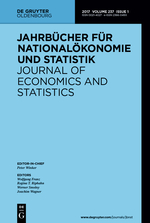
Public Investment Subsidies and Firm Performance – Evidence from Germany
This paper assesses firm-level effects of the single largest investment subsidy programme in Germany. The analysis considers grants allocated to firms in East German regions over the period 2007 to 2013 under the regional policy scheme Joint Task ‘Improving Regional Economic Structures’ (GRW). We apply a coarsened exact matching (CEM) in combination with a fixed effects difference-in-differences (FEDiD) estimator to identify the effects of programme participation on the treated firms. For the assessment, we use administrative data from the Federal Statistical Office and the Offices of the Länder to demonstrate that this administrative database offers a huge potential for evidence-based policy advice. The results suggest that investment subsidies have a positive impact on different dimensions of firm development, but do not affect overall firm competitiveness. We find positive short- and medium-run effects on firm employment. The effects on firm turnover remain significant and positive only in the medium-run. Gross fixed capital formation responses positively to GRW funding only during the mean implementation period of the projects but becomes insignificant afterwards. Finally, the effect of GRW-funding on labour productivity remains insignificant throughout the whole period of analysis.





